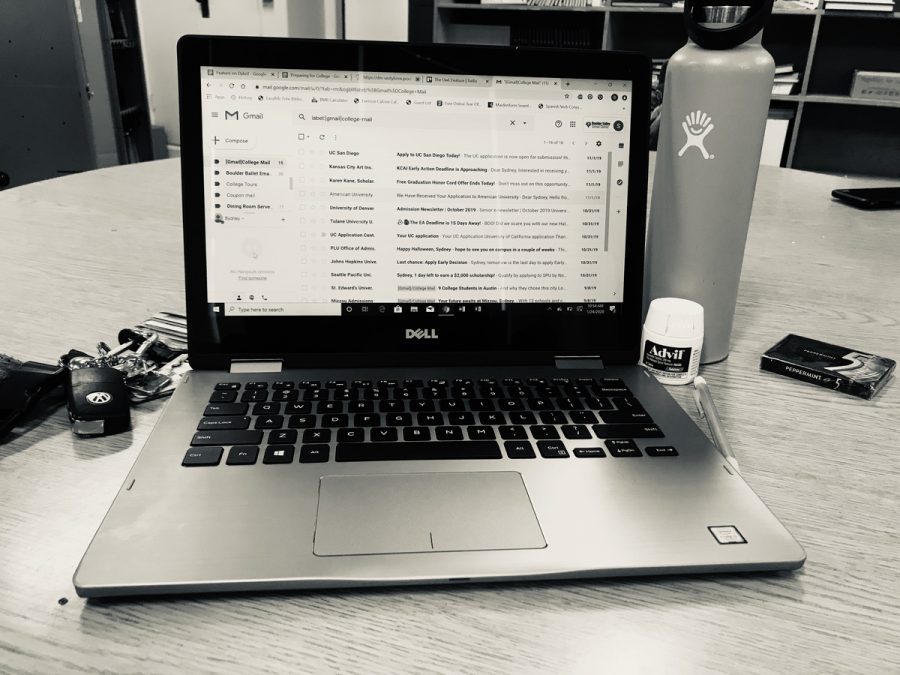Preparing for College: An Uphill Road
A simple set up that all high school students need to succeed: Computer, Water Bottle, and Advil.
College. A long, stressful, and intense process that seems to originate in the womb. Now, this may seem like a bit of an exaggeration, but please, let me explain. College today is all about money; if you can’t pay for it, you get a loan, which will put you in thousands of dollars of debt by graduation. If the mother birthing you doesn’t have the resources to pay for a good education, you’ve already lost half the battle. From the start, you have to be sure to always do your homework, eat healthily, and participate in every sport, extracurricular activity, club, job and internship that you possibly can. You want to guarantee that your application is riddled with activity after activity; anything less would just show that you spent time with your family or that you take care of yourself, which is completely unacceptable to a college admissions counselor. And you mustn’t forget middle school; it’s when you learn your most critical habits and set the ways in which you are going to spend your time for the rest of your school career. And of course, we cannot ignore high school, the time when you discover so much about your personality, body and the people around you. Every moment is filled with extreme drama, anger and sadness; nevertheless, you should continue to get straight A’s, make perfect relationships with your teachers and administrators, attend school events, study for the SAT and ACT, continue to do loads of activities, clubs, and sports and volunteer around your community. But please don’t think you can’t have a social life and time for yourself and your family; you’ll have plenty of time for that. Just make sure you aren’t doing drugs, drinking alcohol, or ruining your future. In the way that every aspect of your life from first breath to walking the aisle to graduate revolves around this one element that determines your whole future, preparation for college begins in the womb.
In all seriousness, college and the time spent preparing and applying for it can be very stressful and time-consuming. Students understandably have a hard time balancing extracurriculars, jobs, sports, caring for themselves and their families, school, social lives and applications for colleges. Students are pressured to apply by a myriad of certain deadlines; just so they don’t forget, they are sent around 75 emails a day from colleges interested in them. At the same time, students are expected to find their life passion, pick a school that has a major they want that fits their level of success and is financially appropriate in a location they desire. It is recommended that they visit colleges, take online tours, take standardized tests multiple times, do as much research as possible on each college and then finally begin applying. For many, the time and money required to do these things just isn’t there. This adds more stress to the student and their family. Time has been short since we entered high-school freshman year; many students feel unprepared for their testing and application deadlines.
While there is so much stress associated with college and the application process , there are so many paths and options that are not highlighted or discussed in the realm of post-secondary education. Below is a compiled list of things that upcoming high school students, freshmen, sophomores and juniors should consider when applying to college.
- Understand all of your options as an individual: some of us don’t have the resources to attend a private Ivy League. However, that doesn’t mean you can’t find different ways to attend the school of your dreams. Search around to find the school that best fits your personal needs, educational goals, and financial constraints; don’t get blinded by the prestige of top schools.
- Take your time: As much as this sounds impossible, it is better to find a path for yourself without a time restraint. Colleges really highlight their deadlines by sending emails with threatening messages, but what they don’t mention is that for many institutions you can still apply after these dates. According to one college resource website, “Many colleges continue to accept student applications well past posted deadlines and throughout the summer. Some schools have Rolling Admissions, which means that they continue to accept students until the class is filled.”
- Take standardized tests when you are given the option: Unfortunately, college applications are heavily based on our testing scores. While some schools have test-optional applications, a lot of colleges still require them. According to a recent study described on a website called Education Drive, 54 percent of colleges shared that SAT/ACT scores are “considerably important” when making decisions about students. Take advantage of opportunities provided to you like the SAT and PSAT days provided to juniors and sophomores by the school to improve your score and study in the days leading up to these exams.
- Find a fit for YOU: find a school based on location and community both in and out of the school. You should consider weather, price of living, culture, work opportunities outside and after school, etc. While parents or peers may be quick to impose their ideals in your process, remember that you are picking a school to study and live at for at least a few years and should feel a connection with the learning environment you pick.
- Set aside time each weekend to do applications and time to do the FAFSA. According to the FAFSA website, applying for it “gives you access to the largest source of financial aid to pay for college or career school.” Set aside time — preferably over a few days — to work with your parents/legal guardians on the lengthy and technical application.
- Talk to your current teachers about recommendations as well as to get advice on schools, applications, and essays. You should not wait till the last minute senior year and unexpectedly spring a request for a letter of recommendation on your favorite former teacher; as much as you may be their favorite student, it’s best to give the teacher adequate time to articulate your intricacies as a student. Additionally, your teachers can provide feedback on essays if asked politely and may be able to give insight on schools that would be good for you.
- Don’t stress yourself out with all the deadlines: find the deadlines that apply to you and mark them on your calendar. Alexandra Pannoni, a writer for U.S. News and World Report, highlights that students who do their college work early, are able to figure out their post graduation plans early and enjoy the rest of their highschool career without stress. So while it may be less stressful to apply early, it isn’t absolutely necessary if your schedule doesn’t align.
- What is all this talk about early decision, regular, early action…? College board describes these in more detail for readers’ use.
- Early Decision: if you apply to a school early decision, you are automatically saying you are going to attend that school if accepted; your decision is binding.
- Early Action: you apply to a school earlier in the year but it is nonbinding. Your decisions are due by May 1st.
- Regular Decision: Apply to as many schools you want by January 1st and decisions by the schools will be made around March.
- Priority Deadline: November 1st application deadline for students to get more opportunities and scholarships.
- What is all this talk about early decision, regular, early action…? College board describes these in more detail for readers’ use.
- Consider taking a gap year: college isn’t for everyone, especially after just finishing 15 years of schooling. Gap years are increasingly highly recommended directly after highschool, allowing students to get jobs, learn to live on their own, and find their passion before pursuing higher education. According to a study done by the Gap Year Association, 92 percent of young adults who take a gap year share that they gained life experiences and grew personally. The website also highlighted that 90 percent of those who took a gap year went back to college the following year.
While I am no expert, I believe these tips are useful for people on their college journeys; however, when looking to the future of high schoolers beyond senior year, I have a lack of knowledge. Minnesota State University recommends continuing to work on applications while keeping deadlines in mind, taking tests if needed, receiving letters of acceptance or rejection, filing your FAFSA, and visiting college campuses as the options are narrowed down. However, we only get one senior year in high school, ideally, so live it to the fullest. Don’t sit at home worrying about your future. Take your time and enjoy this last year of your childhood. Whatever you decide to do next year, you can rest assured that you spent your high school years meaningfully.







